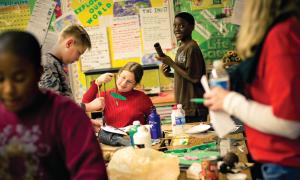article
Children Welcome Diversity on the Playground
Adults often marvel as they watch children frolic on the playground centers. Children’s interactions appear effortless. There seem to be no barriers, no ego or self-doubt. If you want to play with someone, you simply ask him or her. It looks so uncomplicated. If a child is willing and able to partake in the fun, then there are bad guys to vanquish, princesses to be rescued and treasures to be found. A child’s imagination is the only thing placing limits on the exploration.

